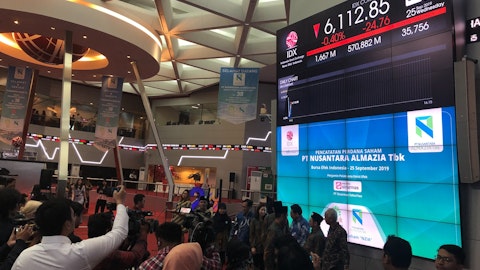Bob Fishman: Absolutely. So, the significantly lower volume in Q4, while we put actions in place, that’s what primarily drove the negative productivity. As we look at 2023, those inefficiencies whether it was air freighting, spot buys, whether it was supply chain challenges, those will reduce significantly and, obviously, help our productivity. Those will be one area. Then, just the actions we took in Q4 around adjusting for the lower volume will benefit us. And then, in addition to that, the transformation initiatives that are starting to benefit us in 2023.
Andy Kaplowitz: Very helpful. And then, Bob, maybe the conviction level to get back to free cash flow conversion of 100%? And if you do get there, obviously, you’ve got some leverage here, but we’ve seen more recent announcements of a little bit of consolidation in, call it, the water equipment space. So, where does Pentair go from here on the M&A front?
Bob Fishman: Yes, I’ll definitely take the first one. We have high confidence in our free cash flow. We will benefit from working capital coming down in 2023, primarily inventories. We’ve established targets and are starting to chart progress. So, I’m confident around the inventory space. We’ll also see benefits versus 2022 in terms of accruals and cash being paid out. So, overall, there’s three or four different areas that give us confidence in the free cash flow. Historically, we do drive a 100% of net income. And when we’ve had a challenging year, we turn around the next year and get back to our typical path. So, high confidence there.
John Stauch: Yes. And as far as the M&A, I mean, short term, we’re going to service the debt just because of the high interest rates. We love our strategy. We believe the move and proven enjoy gives us a lot of flexibility to add to our existing portfolio. But we’re going to be smart. I mean, call me old fashioned, but I think ROIC matters in the long run. It used to be how we measured performance. I still think it matters and I think we have to be disciplined with your capital. And we need to make sure if we put that capital work that we can make these acquisitions deliver to the expectations.
Operator: The next question is from Deane Dray of RBC Capital Markets. Please go ahead.
Deane Dray: Thank you. Good morning, everyone, and welcome to Shelly.
Shelly Hubbard: Thank you.
Deane Dray: We also, John, agree, ROIC matters.
John Stauch: Thank you.
Deane Dray: Hey. And on Manitowoc, just can we circle back on this? One of the obvious upsides was the whole cross-sell opportunity, making sure every one of those ice machines has a Pentair filter. Just can you share with us on the take rate there? Any initiatives that you have to make sure that that process happens smoothly?
John Stauch: Yes. Deane, first of all, I still think we think across all the synergies we said that we’re going to experience those. And we do believe, as we said, there’s certainly account management and making sure that we can service the key accounts across all three platforms, KBI being one of those platforms as well on the service side. We do believe that every ice machine should have a filter and we would hope that it’s our filter since we think we are the best filtration company. But that has been (ph) choice, of course, made by the distributor and the end market. And I think we can help them be aware of why our filters do better and we do believe that take rate is going to be serviced over time.
Deane Dray: Got it. And then, for Bob, the idea here is you’ve got this whole working capital normalization happening. Wouldn’t it be fair to expect that cash conversion would be well above 100% at some point in ’23, just given the kind of cash conversion that you’d expect from working capital alone?





